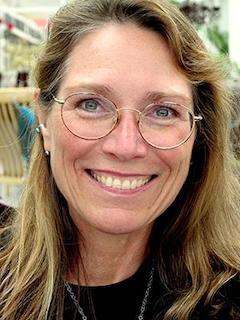An expert in polar climate says drilling data over millions of years help show the future

Credit: UMass Amherst
AMHERST, Mass. – The Geological Society of America’s (GSA) Continental Scientific Drilling Division (CSD) has named University of Massachusetts Amherst geologist Julie Brigham-Grette as one of its two Distinguished Lecturers for 2020, which means she will be available to give online seminars on her Arctic drilling research to geologists anywhere in the world by request this fall and into spring 2021.
Brigham-Grette is a leading world expert in Arctic environmental change who has conducted Arctic research for more than 40 years, including eight field seasons in the Russian Arctic.
She says of the lecture series, “The idea is to promote scientific drilling for discovery and solution-based science. Because of COVID travel restrictions, I will be creating a 45-minute TED-style talk to be recorded by UMass Amherst videographers. This will be shared with interested institutions on request.” She will follow each talk with a Q&A session in real time when possible.
Her lecture is titled, “Impact of Lake El’gygytgyn, northeast Russia, on our Knowledge of Polar Climate: This Changes Everything.” It was at “Lake E” that Brigham-Grette, leading an international team, extracted the longest sediment core ever collected on land in the Arctic, which provides “absolutely new knowledge” of Arctic climate from 2.2 to 3.6 million years ago. It also shows that with estimated atmospheric carbon dioxide similar to today’s levels, the Arctic was very warm in the past, with no ice sheets.
Brigham-Grette says of the GSA recognition, “It is a huge honor to be selected.” The research she will be lecturing about was the basis for her UMass Amherst Conti Research Fellowship in 2011 and the UMass Award for Outstanding Accomplishments in Research and Creativity in 2017.
As Brigham-Grette explains, scientific drilling involves specific research targets to learn more about earth processes. This could involve volcanic systems or active faults to better understand how they work, or drilling into large, long-lasting lakes such as the Great Lakes or ancient marine systems such as the 2,500-foot-deep Cretaceous Seaway over the Great Plains from Mexico to northern Canada between 145 to 66 million years ago. Such cores help geologists to understand natural variability of climate change, she says.
“The climate is dramatically changing now and we can learn from the earlier ‘playbooks’ of change to see how our future will be impacted in the coming century or more.”
“Earth sciences research is vital if society is to address issues such as volcanic eruptions, earthquakes, landslides, distribution of essential elements and critical materials across and below the Earth’s surface, climate change, changes to the global water cycle and relations between geology and biology,” she adds.
In 2020 the National Academies released a “Vision for NSF Earth Sciences 2020-2030” that identified several science priorities that could offer new knowledge to routinely and accurately forecast unpredictable, devastating natural hazards in time to take steps to minimize risk and substantially reduce loss of life.
She says, “Climate change and natural hazards affect large parts of our population, as well as changing regional economics, agriculture and life styles. Climate change is probably the biggest threat multiplier of our times,” referring to extreme weather and water shortages that security experts say increase the risk of political instability.
Brigham-Grette is a Fellow of the GSA and in October will begin a term as president of its Quaternary Geology and Geomorphology Division. Its members study modern earth surface processes and the Earth’s surface evolution over the past 2.6 million years. The other GSA Distinguished Lecturer is John Eichelberger of the University of Alaska Fairbanks, with his talk, “Drilling to Magma.”
###
Media Contact
Janet Lathrop
[email protected]
Original Source
https:/




